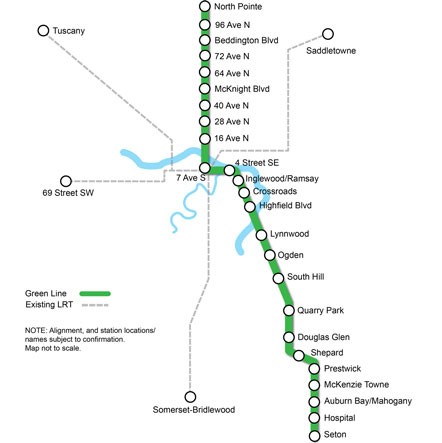Carbon Tax Could be Costly for Calgary Transit
Tomorrow at the Standing Policy Committee on Transportation and Transit we will be discussing the impact of the carbon tax on the operations of our Calgary Transit (CT) fleet. You can find the full report here – Route Ahead Update
Based on 2014 fuel consumption rates the carbon tax will lead to an additional $1.5 million in costs for fuel and an additional $2.25 million in 2018. If we were to negate these costs by reducing service it would result in 15,000-22,500 hours of lost transit service.
The province has made it clear that they will not be providing any exemptions or rebates for municipal transit service on the carbon tax. I really struggle with that. The carbon tax is part of the Climate Leadership Plan. The objective of this plan is to lower Alberta’s carbon footprint and create a more sustainable future – something I’m very supportive of. Unfortunately with the way the carbon tax is currently structured we may see the opposite occur.
Council has a policy that CT must recovery between 50%-55% of their costs through advertising revenue, fare revenue and a few other small revenue streams. This cost recovery is a golden standard for North American transit systems – many other municipalities subsidize as much as 80% of their transit costs.

CT has seen annual revenues decrease by $17M. Lower ridership and fewer advertising contracts have created a scenario where CT is only recovering 49% of their costs – this puts them in violation of Council direction. So what are our options to correct this? We recently went through a Zero-Based Review for CT to find efficiencies in their budget. We will be implementing a number of these recommendations over the next few years. Our other cost recovery options are to raise fares or reduce service. Both of these actions would likely encourage fewer Calgarians to use public transit.
Transit offers significant environmental benefits. Our CTrain fleet is powered entirely from renewable energy. Buses can take up to 60 passengers while CTrains can take up to 600 passengers. Taking that many cars off the road contributes to a more sustainable city and reduces our carbon footprint. These are absolutely things that should be supported by a provincial government that takes climate stewardship so seriously.
We have a carbon tax – that’s an Alberta reality right now. I would urge the Government of Alberta to consider a carbon tax structure that better supports mass transit in our major urban centres. Help Alberta’s cities be active partners on climate leadership. Some revenues from carbon tax should be used to fund transit expansions in order to get more cars off the road and reduce our greenhouse gas emissions. This is especially relevant when we think about the Green Line LRT. We are asking for a lot of money from the province ($1.53 billion). Investing in the Green Line through the carbon tax would not only unlock this important piece of infrastructure, it would take thousands of cars off the road and considerably reduce our emissions.

The current carbon tax structure could potentially decrease our ability to participate in the Climate Leadership Plan. I outlined a few options on how CT may have to respond to increasing operating costs – reducing service or raising fares. Both of these options would encourage fewer Calgarians to use public transit. This means more vehicles on the road, more emissions and a greater carbon footprint. Applying the carbon tax to public transit actually undermines the entire point of the Climate Leadership Plan.
I’m a big supporter of creating a more sustainable future for our province – I think leadership on climate change is a big part of that. With that being said, we need to ensure the tools we are using actually get us to that outcome. Making transit more affordable, accessible and convenient for folks in Calgary would be a major step towards a more sustainable province.
I look forward to a further discussion on this tomorrow at committee. You can watch committee live here – we begin at 9:30 AM.
